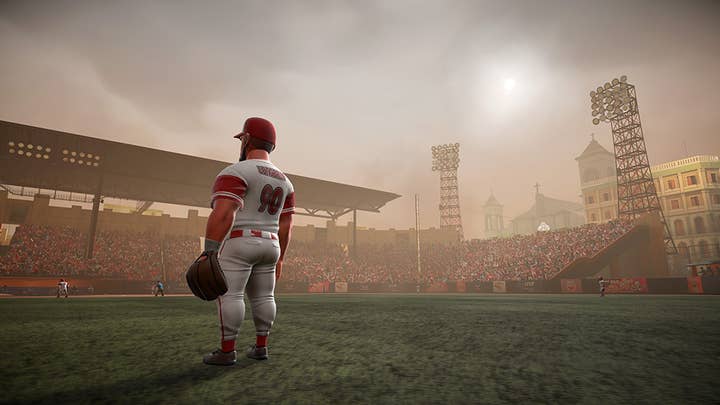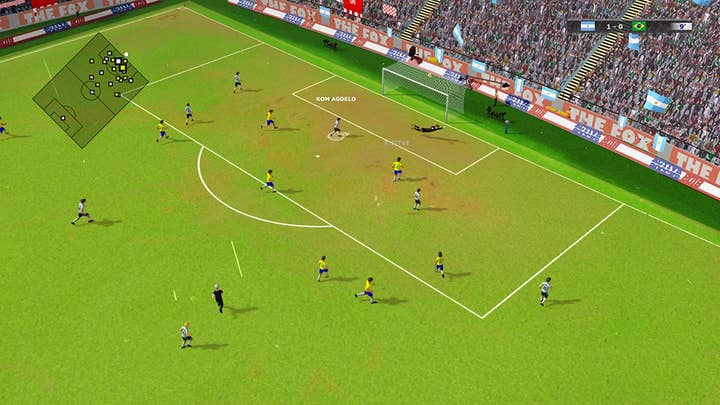Rewriting the playbook: The independent studios making sports work
We explore how developers are carving their own niches in the face of dominating franchises like FIFA and NBA 2K
"There's no shortcut to a good sports simulator."
Scott Drader, co-founder of Metalhead Software, speaks from experience. The Canadian studio's Super Mega Baseball series may have a simple charm, but still demands a high level of detail and functionality.
"You have to solve many of the most difficult areas of game development and then make it all work online, with 30,000 crowd members on screen, rendering at a framerate suitable for twitch gameplay mechanics", he explains.
Such technical barriers help explain why there are few sports games these days, especially compared to the genre boom in the '90s. Starting from the 16-bit console generation, there was always a wide selection of titles available based on football (soccer), basketball, American football, tennis and so on. By the PlayStation era, football games alone were so numerous it was difficult to keep up, each providing a unique take, with earnest simulations rubbing shoulders with speedy arcade-alikes and comical kick-abouts.

But since the turn of the millennium, the variety of commercial sports video games has shrunk, despite how many of the real-life sports they simulate have remained popular and lucrative. Even an otherwise packed indie scene offers limited choice.
No doubt the handful of big name franchises that dominate the market today are partly responsible, as their gravitational pull absorbs everything around them. FIFA 20 had reportedly attracted 10 million players just two weeks after launch last year, and its Ultimate Team model encourages investment from players that potentially takes time and money away from comparable titles. With the licensing exclusivity, online functionality and loyal player base such games possess, it's not surprising there's not much competition.
But Metalhead and other developers have proven in recent years that there's still room for alternatives, and are gradually increasing their profiles. These studios exist alongside the major publishers, producing innovative, authentic or accessible games, without fighting for the same revenues as names such as FIFA, NBA2K and MLB: The Show.
Melbourne-based Big Ant Studios is a prime example. Its portfolio over the last decade has clearly been inspired by the sporting preferences of its homeland: Australian versions of football, rugby league, cricket and now tennis.
"Even though people can create photo-realistic versions of themselves in our games, the community still wants those official licenses"
Ross Symons, Big Ant Studios
"It really started with a passion for sport, and a recognition that here in Australia, some of the most popular sports had been under-represented in video games," says Big Ant CEO Ross Symons. "As a local studio, it seemed like a natural fit for us to create content that, first and foremost, would give back to local fans and the community."
This approach has enabled Big Ant to create its own space. "One of the great things about sports games is that, unlike other genres, different properties aren't really in competition with one another," Symons explains. "Basketball, football, and ice hockey fans aren't necessarily fans of cricket or tennis. Those are different audiences, looking for different games."
And while Big Ant looks to further expand its range, it still has no intention of encroaching on already occupied ground. "Our MO is to support the sports properties out there that are under-represented," Symons adds. "[Sports such as] soccer and basketball are both incredibly well represented by existing developers, so that's not a direction for us."
For Metalhead, conversely, their sport of choice is represented elsewhere, in the Sony-published MLB: The Show. But Super Mega Baseball -- first released in 2014 and about to receive its third outing -- distinguished itself by tying solid gameplay foundations to light presentation and cartoon visuals.
"The original Super Mega Baseball was weird enough that I don't think it was competing with anything," says Drader. "Our range of expectations was broad given that there wasn't anything on the market quite like what we were building, but we figured there was a good chance that a solid, unlicensed title could do at least 100,000 units -- enough to get a small independent studio off the ground."

As the series has developed, however, it's added complexity that might draw comparisons to other titles. "Of course the game has changed over time," Drader continues. "The style and demeanour of the series certainly differs from that of realism-focused broadcast simulators, but in terms of gameplay and mechanics, sure, there is overlap."
Even so, Drader feels that any points of similarity won't reflect poorly on Metalhead's work. "I would say that Super Mega Baseball 3's core on-field gameplay mechanics rival or are actually better than that of the AAA sports games on the market," he says.
For those working to much smaller budgets, it's important to make a virtue of simplicity. Gianluca Troiano, owner of The Fox Software and developer of the Active Soccer series, aims for immediacy in his games, which also taps into memories of old home computer titles such as Kick Off 2.
"Active Soccer does not want to simulate a football game but to offer a fast, simple, fun and challenging game, just like in the old days," Troiano says. "Basically, the only thing in common with FIFA is that there are 22 players on the pitch and a ball."
And it seems there's a separate audience for this kind of football experience. "Sometimes I get messages from moms who buy the game for their kids," he continues. "Active Soccer seems to work well for younger kids."
Development of Active Soccer was originally viable because of Troiano's choice of platform. "It was 2011," he explains. "The phenomenon of apps on smartphones had just exploded and represented for me an opportunity to release something completely mine. The first Active Soccer was released in 2012 on iOS, I didn't have high sales expectations. It was an opportunity to test the market."
After receiving positive feedback he was able to create Active Soccer 2, with its more expansive career mode and competition options, and later to move into development for consoles.
Yet while these developers aren't chasing the same revenues as FIFA or MLB: The Show, those and other big franchises still cast a long shadow, by raising player expectations of what a sports game should deliver.
"We have to keep in mind that the budget for an indie football game is often 1,000 or 2,000 times lower than for an edition of FIFA"
Gianluca Troiano, The Fox Software
"With the increase in technology and computing power, gamers expect a high standard," Troiano says. "Often unconsciously a comparison is made with the big games such as FIFA or PES on presentation, graphics, animations and tactics, but it is an unfair comparison. We have to keep in mind that the budget for an indie football game is often 1,000 or 2,000 times lower than for an edition of FIFA."
For Symons, there's an extra challenge in sports game development compared to other genres due to demands for realism. "Most fans of sports have hands-on experience," he says. "They may play casually, or at least attend matches. When developing sports games, you've got to provide that experience that they know, personally, in a way that feels authentic and real."
This can only add pressure to all areas of development, from animation, AI and physics, to TV-style presentation, tactical options and career modes, especially when big annual releases keep edging forward in these areas.
There's also the matter of official licensing, enticing players with familiar stadiums, team names, logos and player likenesses. For Troiano, the lack of licensing for Active Soccer isn't necessarily a problem.
"I honestly think that official licenses would not make much difference" he says. "The game is not designed for physical identification of the players with the real counterparts. I am convinced that in Active Soccer it is important what happens on the pitch."

Similarly, Drader explains that it's not necessarily a good fit for every game. "Leagues have become extremely protective of their image in recent years," he says, "and if you take a spin with Super Mega Baseball 3 you'll see there are a lot of things in there that don't exactly jive with the relatively sanitized presentation you see in licensed sports games."
Still, the power of licensing is hard to ignore. As Drader says, "I'll admit that a licensed adaptation of the Super Mega Baseball gameplay engine and tech would probably sell a lot of video games."

Big Ant has certainly seen the benefits of securing licenses for its products. "Licensing is highly valuable for sports properties," says Symons. "We find that, even though we provide player creators of such depth that people can take photos of themselves and create photo-realistic versions of themselves and their friends in our games, the community still wants those official licenses."
Licensing has also helped build that community through the association it enables with real-life sports. "We work closely with the licensors," Symons continues, "such as Tennis Australia or Cricket Australia/English Cricket Board, to make sure that their audiences know about our games, just as they're starting to watch the sports on TV or go along to the events. Letting players 'play along' with the real-world events has been core to the success of our properties."
For Super Mega Baseball or Active Soccer, building and maintaining a community relationship thus requires more direct communication. For Drader, the key aspect is transparency and openness. "We've made sure to be honest about where we're at with the game at any given time," he explains, "and have tried to manage expectations about the things we ship so that our community can trust what we tell them about what's coming in the future."
Troiano has relied on word-of-mouth and an even more hands-on approach due to his limited resources. "When I released Active Soccer 2 on iOS, I spent a lot of time taking care of the forums of the major websites that dealt with Apple devices," he explains. "Today the situation is much more difficult. Since users frequent various websites and social networks, I intercept the discussions that arise in the various places."
"There's no shortcut to a good sports simulator"
Scott Drader, Metalhead Software
If these studios face different challenges at their different levels, one thing that unites them is their belief in further expansion. Symons looks at Big Ant's current tennis series as an example of what can be achieved.
"There was a long hiatus of high quality tennis games on the market", he says, "and across the two AO Tennis titles we've produced so far we've started to draw those fans back into video games... We're also exploring new platforms and opportunities around esports that will engage a broader community more deeply."
For Super Mega Baseball, the aim appears to be to keep going and keep steadily growing. "In terms of potential for success," says Drader, "there are a lot of changing variables right now and not a lot of long-running unlicensed team-sports games to compare this thing to, so it's hard to predict. We probably won't put up AAA numbers but we expect to keep moving in that direction and to do well for a studio at our size and cost structure."
Troiano's position seems more difficult. "To increase the budget it would be necessary to increase the revenues," he says. "At the same time to increase the revenues, it would be necessary to have a bigger budget. There is a deadlock."
But, he continues, if that deadlock can be broken, perhaps by revenues from subscription services, "there is a large gap to be filled on the presentation, graphics, animation and AI side that could significantly increase sales."
He feels that Active Soccer could be a stepping stone to realising a more ambitious project he's working on, and that even the big names aren't out of reach. "So far all the indie soccer games have focused on immediacy, deliberately leaving out some aspects [of the sport]," he says. "The first who creates a complete product with a well-structured company staff will establish himself as a third option together with FIFA and PES."
Ultimately, as long as a variety of professional sports succeed in the real world, there should be an audience for them in game form. And even with the biggest sports, there's genuine appeal in alternatives, especially as some fans start to become disillusioned with a lack of advancement each year in established franchises, or their emphasis on microtransactions.
There still isn't the range or level of competition at the top there used to be, but these studios have found ways to play the game to their advantage. Particularly right now, when real-life sports are on hold, their work seems especially valuable.

